We all have or have had interactions with dogs, and somehow we know them better than other animals in the world. As responsible humans. We have a particular place in our hearts for dogs since they are devoted and caring friends. As conscientious pet owners, we must ensure that our animals are receiving the proper nourishment from their diet. The food requirements of dogs differ based on their breed, age, size, and degree of activity. High-quality dog food offers all the vital nutrients, protein, carbs, fats, vitamins, and minerals necessary for their general health. Have you ever seen dogs eat onions?
These nutrients help with digestion, immune system bolstering, lustrous coat promotion, and healthy development. Selecting a dog food company that stays away from artificial additives and fillers and instead employs natural ingredients is crucial. It is possible to help them maintain their weight and avoid health problems by providing a balanced meal that meets their individual demands, such as dry or wet food. Treats and the odd home-cooked meal can also be added to their dining regimen to give it some excitement and variation. Recall that a well-fed dog becomes a joyful and pleased friend who will shower you with affection and happiness.
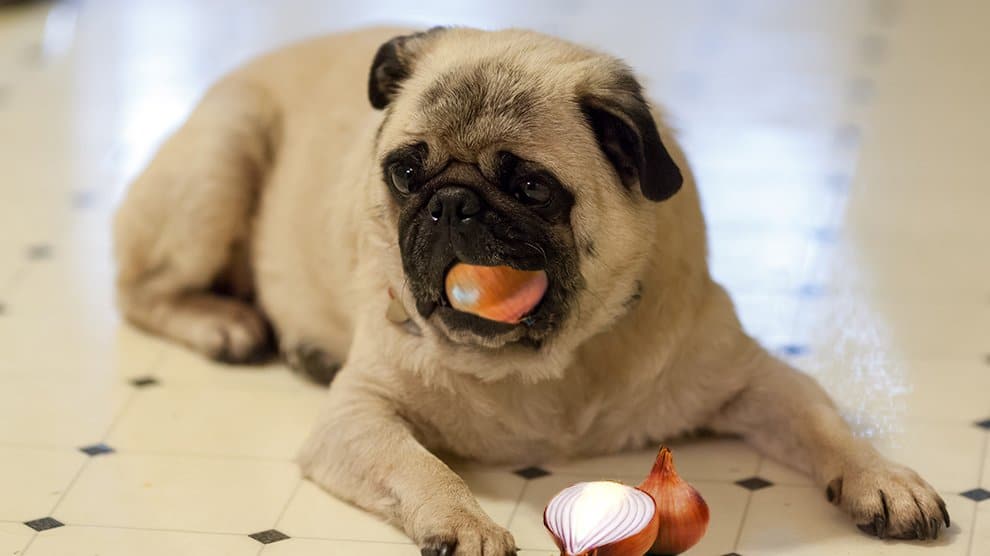
Can a dog eat onions?
Can dogs eat onions?
One of the commonly asked questions is, can dogs eat onions? Dogs should not be fed onions due to their allergies Dogs may get toxically exposed to significant quantities of thiosulfate, a chemical found in onions. This may result in several symptoms, including diarrhea, vomiting, and even breathing difficulties. As a result, it is usually advised against giving dogs onions.
Dogs need a balanced and nutrient-rich diet for their general health and well-being. Dogs need a diet high in protein, good fats, and vital vitamins and minerals, just like people do. It’s crucial to speak with a veterinarian to find out your dog’s unique nutritional requirements, depending on things like breed, age, and activity level. It is normally advised to feed your dog high-quality, professionally produced dog food and occasional treats. It’s crucial to keep poisonous items away from dogs, such as chocolate, onions, and grapes. Furthermore, it’s critical to check weight and practice appropriate portion management because obesity in dogs can result in some health problems.
- Wow! When and Why Do Prairie Dogs Kiss Each Other?
- A Selection of Lawn Care Tips for Dog Owners
- What was Released on WWDC 2023?
Sometimes dogs may safely consume modest amounts of sautéed onions. Still, it’s advisable to err on the side of caution and refrain from feeding them any onions at all. If your dog inadvertently consumes onions, it’s critical to keep a watchful eye out for any symptoms of disease and, if required, seek veterinary assistance. As always, you should always seek expert advice before making any dietary modifications for your dog.
How bad are onions for dogs?
For dogs, onions are extremely poisonous and can result in many health issues. This well-known vegetable includes substances known as thiosulfates and disulfides, which can harm a dog’s red blood cells and cause hemolytic anemia. Symptoms including weakness, vomiting, diarrhea, and pale gums may arise from this. It may potentially be lethal in extreme circumstances. Smaller dogs are more vulnerable to the harmful chemicals found in onions since they may exhibit symptoms at lower dosages and have a reduced tolerance to them.
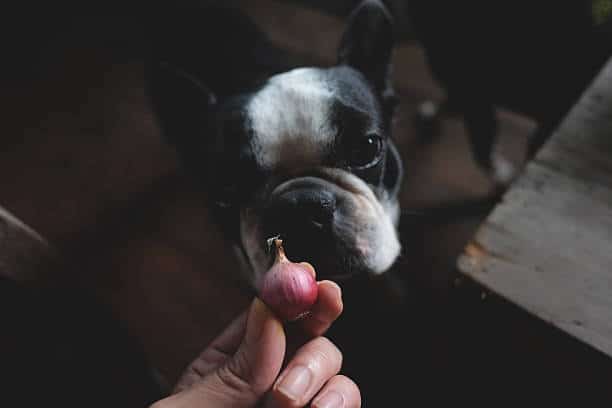
Can dogs eat onions?
Onion toxicity, however, can affect even larger dogs if they eat a lot of them. Onions are dangerous, not just when they are raw. The same poisons are present in cooked, dehydrated, or powdered onions, which is why they have to be avoided. Dogs shouldn’t be able to access things like pizza, soups, and sauces that include onions. Due to genetic variations in how they digest and metabolize onions, some dog breeds—like Japanese breeds—are more prone to onion poisoning. Dog owners must thus make sure that their pets do not eat onions and are aware of the risks associated with them. To avoid any major consequences, it’s imperative to seek prompt veterinarian attention if a dog exhibits any symptoms of onion poisoning.
Are onions toxic to dogs?
Although onions are a common component in many of our favorite recipes, did you realize that dogs may be severely poisoned by them? Dogs that suffer from onion poisoning face a dangerous illness that, if untreated, may be deadly. Because onions have a high thiosulfate concentration, which has been shown to damage and cause anemia and red blood cell formation, dogs are especially sensitive to onion poisoning. To get medical help as soon as possible if their dog has come into contact with onions, pet owners must recognize the symptoms of onion poisoning. Additionally, as prevention is always preferable to treatment, pet owners must take action to stop their dogs from eating onions in the first place. The following points explain the onion’s toxicity to dogs:

onions
1. What is onion toxicity in dogs, and why does it matter?
Eating foods containing Allium species, such as garlic or onions, can poison dogs. This condition is known as allium toxicosis, and it can cause gastrointestinal problems as well as hemolytic8 anemia.
If consumed by dogs, any member of the Allium family, whether raw or cooked, as well as dried flakes or powder and even dietary supplements, can result in toxicosis. Because the amount of poisonous chemicals varies depending on the species and variation, the severity of symptoms also varies.
The gastrointestinal tract’s organosulfur compounds, such as thiosulfates and N-propyl disulfide, can interfere with glutathione synthesis. Because of this lack of defense, hemoglobin molecules become denaturized and cluster together to form what are known as Heinz bodies. Hemolysis, the term for the death of red blood cells as a result, occurs both within and outside of blood vessels.
Although the severity varies depending on the preparation and species consumed, gastrointestinal problems are also a concern with allium consumption. Depending on how and what kind of allium is consumed, eating veggies like onions can have varying degrees of gastrointestinal side effects.
2. The toxicity of onion poisoning in dogs
Any type of Allium spp., including garlic, onions, and shallots, can cause erythrocyte damage in dogs and cats. However the disease only becomes clinical when the body’s ability to heal and regenerate itself is outmatched by the rate at which red blood cells are destroyed. Hemolysis, or the breakdown of red blood cells, happens three to five days after dogs consume onions or garlic.
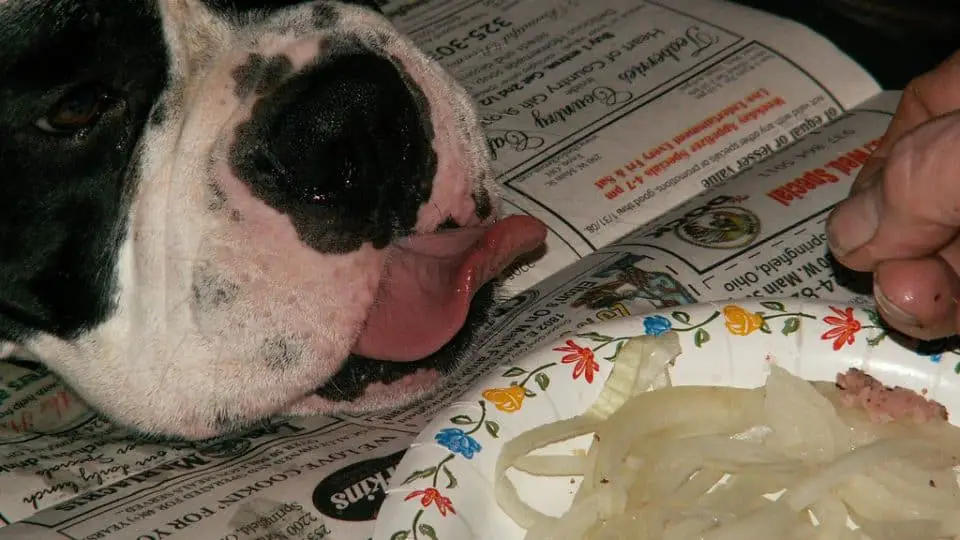
onion poisoning in dogs
Dogs will get poisoned by eating huge quantities of onions or by ingesting small amounts over an extended period. The kinds and concentrations of organ sulfoxides in the plant are connected to its toxicity. Onions and garlic get their flavor and aroma from substances called scows, which are released by enzymes when plant cells are broken. The more poisonous it is, the greater the flavor or odor. Garlic supplements are less likely to be harmful if they don’t have overpowering flavors or odors.
Dogs that are exposed to onions are not susceptible to spoiling, cooking, or dehydration. Because of their concentrated nature, onion and garlic powders are far more hazardous in tiny doses than raw plant material.
3. What are the clinical signs of onion toxicity in dogs?
Dogs who are poisonous to onions may exhibit gastrointestinal symptoms such as sadness, loss of appetite, vomiting, diarrhea, and stomach discomfort. Dehydration is an additional possible outcome. While some dogs may have upset stomachs, most don’t exhibit any symptoms until a few days after there is serious damage to red blood cells.
Other toxic symptoms, such as tachypnea, dyspnea, weakness, icterus, and dark urine, may appear one to seven days after intake. Pale mucous membranes might also be seen.
4. How is onion toxicity diagnosed in dogs?
A physical examination and laboratory testing are used to confirm the diagnosis in cases of onion poisoning. A complete blood count (CBC) is the first test indicated for onion poisoning in dogs in order to identify the existence of Heinz bodies, which are red blood cells with an irregular form. It also takes a Heinz body count to assess the degree of onion toxicosis. Furthermore, eccentricities are a key indicator of garlic-induced hemolysis if they are seen in the CBC.

Sick Dog
To evaluate organ function or damage caused by onion toxicosis, your veterinarian may also suggest further testing. These tests include biochemical profiles, urine, abdominal radiography, or ultrasounds, which may show an enlarged liver and spleen.
5. What is the treatment for onion toxicity in dogs?
Unfortunately, there isn’t a particular treatment for canine onion poisoning. Any life-threatening symptoms that the dog needs to be treated right away. If necessary, oxygen and/or a blood transfusion ought to be given.
Puking can be required if a significant quantity of onion or garlic has been ingested in the last two hours. For further information on how to induce vomiting, speak with your veterinarian. Activated charcoal may be used to help bind and remove onion toxins from the gastrointestinal tract if intake took place more than two hours ago.
Intravenous fluid treatment can be used to treat patients who have had vomiting or diarrhea-related dehydration. Furthermore, this treatment modality can reduce the likelihood of renal tubular injury associated with hemoglobin within the kidneys.
6. Can onion toxicity in dogs be prevented?
Refusing to give dogs onions and garlic products is the best strategy to prevent onion poisoning in dogs. Make sure to properly dispose of any onion or garlic bits your dog may find on the floor if you are using them for cooking. Furthermore, it’s critical to guarantee that your dog cannot access goods containing onions and garlic, such as dried onion flakes or onion powder. Additionally, it’s best to stay away from over-the-counter flea preventatives that contain ingredients based on allium.
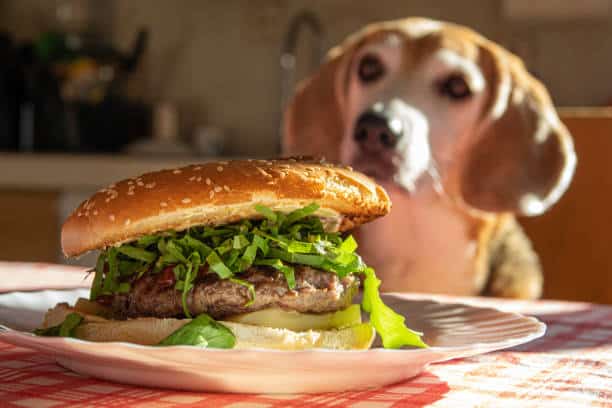
dog
What kinds of onions can dogs eat?
A frequent element in many human cuisines, onions can possibly hurt our animal friends despite adding taste to our meals. N-propyl disulfide and thiosulfate, two of the poisonous ingredients in onions, are particularly sensitive to dogs. These substances have the potential to oxidatively harm a dog’s red blood cells, which can result in hemolytic anemia. Therefore, it is usually advised against giving dogs any kind of onion, cooked or raw, even if it is dried. This covers all varieties of onions, including red, yellow, and white onions.
Furthermore, as they may also be hazardous to dogs, other foods containing onions, such as onion powder or flavoring, should also be avoided. It’s critical that dog owners keep any meals containing onions out of their pets’ reach and understand the possible risks associated with them. In the event that a dog inadvertently swallows onions, it is imperative to seek emergency veterinarian treatment due to the potentially fatal poisonous consequences. In conclusion, all varieties of onions should not be fed to dogs, and care must be taken to ensure that they do not unintentionally come into contact with this dangerous substance.
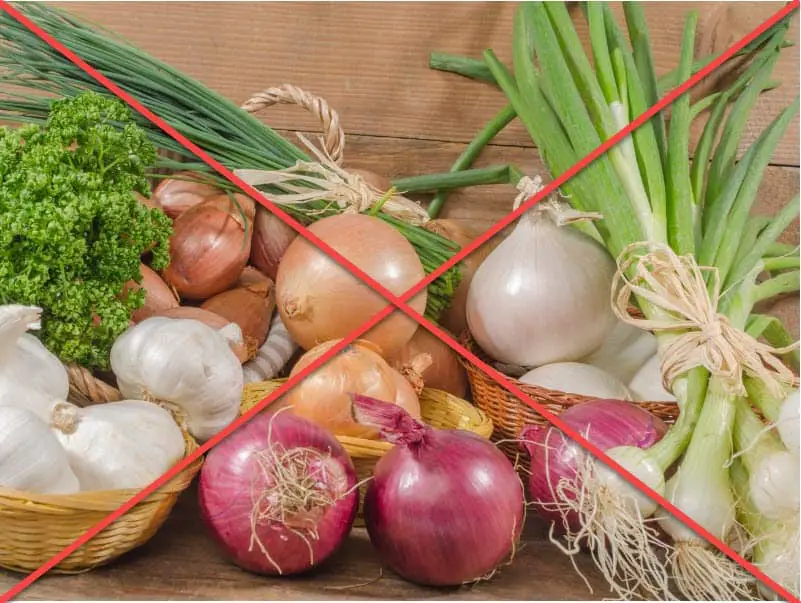
onion types
Symptoms of onion toxicity?
Although onions are frequently used in human cuisine, dogs can be severely poisoned by them. Onions have a powerful flavor and aroma, but they also contain substances that may be toxic to our dog pals. The majority of dog owners know that chocolate and grapes can be harmful to their pets, but many are unaware of the possible risks associated with onions. These are a few signs that a dog is poisoned by onions.
1. Vomiting and diarrhea
Two of the most typical signs of onion poisoning in dogs are these two health issues. This is due to the presence of substances in onions called thiosulfates and disulfides that have the potential to irritate and inflame the gastrointestinal system.
2. Weakness and Lethargy
General weakness and lethargy can be caused by onions poisoning a dog’s system. This might manifest as your dog suddenly losing their zest and energy or as them being more lethargic than normal.
3. Appetite Loss
Dogs that are sensitive to onions may find it difficult to eat their usual meals. If this is not treated right away, it might result in malnourishment and dehydration.
4. Pale gums
Onions may inhibit a dog’s body from producing as many red blood cells. Anemia, which is characterized by pale gums, may arise from this.
Rapid Heart Rate and Breathing: In extreme situations, the toxicity of onions may cause dogs’ red blood cells and oxygen levels to drop, which will raise their heart rate and respiration.
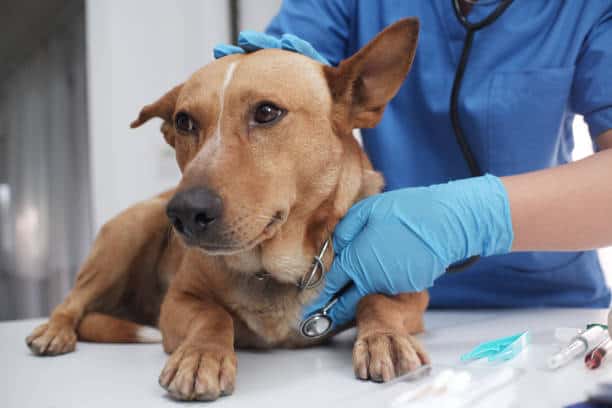
sick dog
5. Hypersensitivity responses
Onions may cause allergic responses in certain dogs, which might include hives, skin swelling, redness, and itching.
6. Heinz Body Anemia
Certain substances found in onions have the ability to harm a dog’s red blood cells, which results in the illness known as Heinz body anemia. If treatment is not received, this might be fatal and lead to the destruction of red blood cells.
7. Weakness and Incoordination
As onion poisoning worsens, dogs’ neurological systems may be affected, which can lead to weakness and incoordination. This may show up as paralysis, trouble standing, or even tripping.
8. Jaundice
Dogs with severe onion poisoning may get jaundice, which is a yellowing of the skin, eyes, and gums. This is an indication of liver damage and has to be treated right away.
9. Collapse or Coma
Onion poisoning can cause collapse or even a coma in severe situations. This is an emergency that has to be attended to by a veterinarian right now.
It’s critical to get your dog medical attention right away if you think they may have eaten onions. The size of the dog and the quantity of onion consumed might affect how severe the symptoms are. Seeking expert assistance and erring on the side of caution is always a wise decision. To avoid unintentional consumption, keep onions and other hazardous items out of your dog’s reach.
What parts of onions are toxic?
Dogs should not consume any part of the onion plant, including the flesh, leaves, juice, and processed powders. Onions and other members of the allium family, such as shallots, leeks, chives, and garlic, are toxic to dogs, whether they are eaten raw, cooked, fried, or powdered.
Surprisingly, a lot of items, including baby food and soups, include onion powder. A 45-pound dog would only need to consume one medium-to-large onion to reach dangerously high levels of toxicity since it only takes 100 grams of onion—roughly the size of a medium onion—per 20 kg of the dog’s weight to have toxic effects. This is a major worry since most dogs would gladly gobble up a bag of forgotten onion rings or an onion casserole if they had the chance.
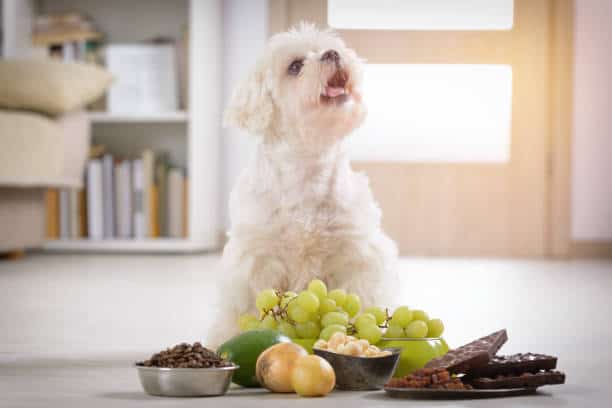
Onions
Powdered onions and garlic are even more powerful than raw onions. Any human food we give our dogs should always have a label, and onion powder should be on your list of things to avoid. Be advised that onions are considerably more harmful to cats than they are to dogs, so avoid giving onion snacks to any pet’s stomach. This is especially important for multispecies families.
What should I do if my dog eats onions? And the treatment?
Common household foods like onions can enhance the taste and nutritional value of our meals, but it’s important to remember that onions, like other allium family members like garlic and leeks, can be toxic to our pets, especially dogs. While a small number of onions may not be harmful, consuming a large quantity can result in serious health issues. If you think your dog may have eaten onions, it’s important to seek medical attention right away to prevent any potential complications. The following treatments can help if your dog eats onions:
-
Identify the symptoms
Search for any signs that your dog could be exhibiting as a starting step. Canine onion poisoning frequently manifests as vomiting, diarrhea, weakness, lethargy, dyspnea, and an elevated heart rate. It’s critical to take quick action if your dog is displaying any of these signs.
-
Call your veterinarian
Making a call to your veterinarian is the next step. Depending on how many onions your dog ate and how they are feeling right now, they can give you advice on what to do. Your veterinarian may advise you to bring your dog in for emergency care or may give you advice on how to manage the problem at home, depending on the severity of the condition.
-
Induce vomiting
It could be advised by your veterinarian to induce vomiting if your dog has recently eaten onions and is not exhibiting any symptoms. Giving your dog a tiny dose of hydrogen peroxide can help with this since it can irritate their stomach and make them throw up. But don’t do this without your veterinarian’s advice, since it could not be safe in some circumstances.

What should I do if my dog eats onions?
-
Monitor your dog closely
Your veterinarian might advise keeping an eye out for any symptoms of distress in your dog if they have consumed a significant quantity of onions. Keep a careful check on them and be alert for any behavioral or health-related changes. Get in touch with your veterinarian right away if they begin to exhibit any worrying signs.
-
Provide supportive care
If your veterinarian has given you the go-ahead to take care of your dog at home, you may help manage their symptoms by giving them supportive care. This might involve making sure they have access to lots of water, feeding them modest, regular meals of a bland diet (such as rice and boiled chicken), and keeping an eye on their hydration levels.
-
Seek medical treatment
In extreme situations, if your dog eats a lot of onions, your veterinarian could advise taking them in for medical attention. This may entail giving them IV fluids to stay hydrated, monitoring their vital signs, and delivering activated charcoal to help absorb any leftover poisons.
-
Prevent future incidents
Keeping onions out of your dog’s reach is essential to preventing him from consuming them in the future. Any onion peels or leftovers should be disposed of appropriately and stored in a sealed container. Additionally, be cautious while preparing meals and avoid giving your dog any items that include onions.
As a result, it’s critical to take prompt action and, if necessary, seek expert assistance if your dog consumes onions. Your dog may recover from onion poisoning and prevent any major health issues with the correct care and treatment. Never forget to speak with your veterinarian about any possible poisoning or health issues pertaining to your pet.
Healthy vegetables for dogs?
As animal lovers, we always want to ensure that our pets are receiving the healthiest diets available. This also applies to what they eat; as natural and organic food alternatives become more and more popular with people, many dog owners are now searching for healthy options for their canines. Adding wholesome veggies to your dog’s meals is one of the best methods to guarantee that they are eating a well-balanced and nutrient-rich diet. Among the best veggies for dogs are the following:
It’s crucial to gradually add new veggies to your dog’s diet because making a quick switch might upset their stomach. Additionally, be sure to give all veggies a good wash to get rid of any possible pesticides or dirt before giving them to your dog. Vegetables can be eaten raw or cooked, but since oils can be detrimental to dogs, it is better to avoid seasoning or adding any. Additionally, before making any significant dietary changes for your dog, it’s crucial to speak with your veterinarian.
Best veggies for Dog:
1. Carrots:
In addition to having few calories, this crunchy vegetable is a great source of vitamins and minerals. Beta-carotene, which the body converts to vitamin A and is essential for maintaining good vision and immune system function, is abundant in carrots. Additionally, they are a wonderful source of fiber, which promotes healthy digestion and may help control weight.
2. Green beans:
These crisp veggies are a fantastic source of calcium, iron, and the vitamins A, C, and K. Green beans are a good option for dogs that need to control their weight since they are low in calories and high in fiber. They are also an excellent source of antioxidants, which have the ability to strengthen immunity and fend against illness.
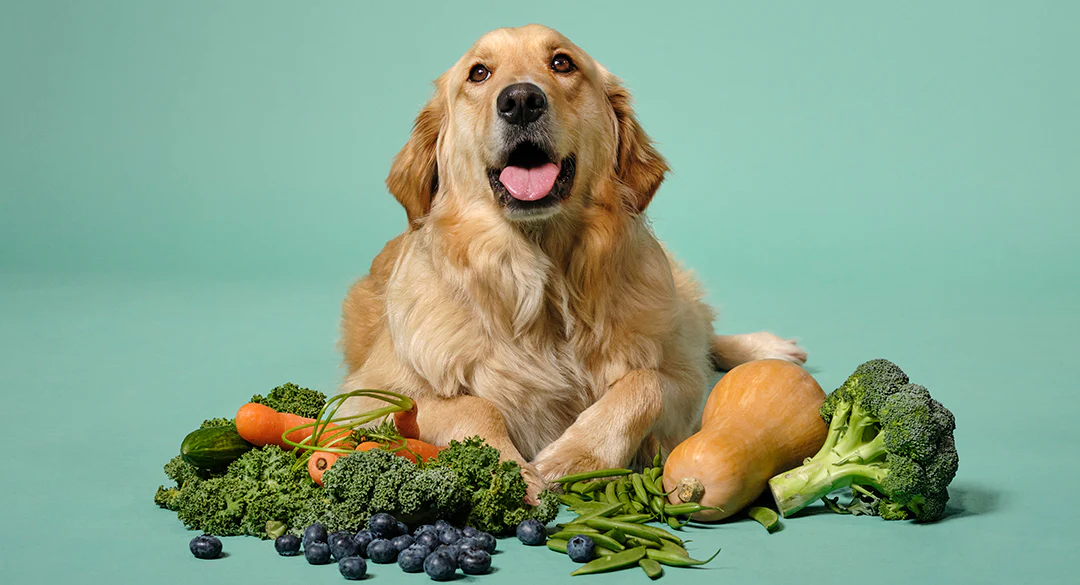
Dog
3. Spinach:
Packed in iron, folate, vitamins A, B, C, and K, and other minerals, this leafy green vegetable is a nutritional powerhouse. Additionally, spinach, rich in antioxidants, can enhance your dog’s general well-being and energy. It should be mentioned, though, that spinach has a lot of oxalic acid, which might prevent the body from absorbing calcium. As a result, it should only be given to dogs in moderation.
4. Sweet potatoes:
This root vegetable provides an excellent source of complex carbohydrates, which give your dog long-lasting energy. In addition, it has significant levels of fiber, potassium, manganese, and the vitamins A, B6, and C. Antioxidants found in sweet potatoes can also help reduce inflammation and may even be able to prevent cancer.
5. Broccoli:
Packed in vitamins and minerals, including iron, fiber, and vitamins C and K, broccoli is another cruciferous vegetable. Additionally, it has phytochemicals that might strengthen the immune system and aid in liver detoxification. It’s crucial to remember, though, that broccoli’s high fiber content can cause upset stomachs when fed in excess to dogs.
To sum up, feeding your dog a diet rich in veggies can improve their general health and well-being in a number of ways. But it’s important to feed them sparingly and ask your doctor which veggies are best for your particular dog’s requirements. Your dog may have a tasty and nutritious diet if they have the proper proportion of healthy veggies in their diet.
FAQ
1. Will a little onion hurt my dog?
Dogs should not consume any part of the onion plant, including the flesh, leaves, juice, and processed powders. Onions and other members of the allium family, such as shallots, leeks, chives, and garlic, are toxic to dogs, whether they are eaten raw, cooked, fried, or powdered.
2. Can dogs smell onions?
You might believe that because onions are so strong, your dog won’t eat any that fall to the ground. But never think your dog won’t attempt to eat a little bit of onion or garlic that has dropped off the counter while you’re cooking. Dogs enjoy strong-smelling things like cheese and onions.
3. Is it okay if my dog accidentally eats onions?
Dogs may eat onions and may get poisoned by onions. Large servings of onions can seriously impair your dog’s health and lifespan, even though in lesser amounts they could simply suffer from minor indigestion. Onions can cause toxicity or even death when either raw or cooked.
Conclusion
In summary, it is evident that the unqualified negative response to the query “Can dogs eat onions?” is given. Onion is a frequent element in many human cuisines, but because it contains thiosulfate compounds, it is harmful to dogs. In dogs, these substances can cause serious health problems like anemia, upset stomachs, and even harm to organs. It is vital for dog owners to prioritize their health and wellbeing by keeping their pets away from this dangerous vegetable and to be aware of the risks associated with feeding their dogs onions.
In the unlikely event that a dog consumes onions, it’s critical to contact a veterinarian right away. The poisons may take several days to start causing symptoms, so they might not show up right away. However, the likelihood of the dog making a full recovery can be raised with early identification and treatment. Along with baby food, canned soups, and certain sauces, pet owners should be wary of other meals that can include onions. They should also carefully check the ingredients before giving their dog any human food.
It seems logical that we would want to provide our cherished pets with a balanced, nourishing diet as responsible pet owners. Although onions are prohibited, dogs may still enjoy a variety of other healthy veggies. Carrots, green beans, and sweet potatoes are a few examples of foods that are high in vitamins and minerals and can support a healthy weight in dogs. But keep in mind that these foods should only be added gradually and in moderation since abrupt dietary changes can also upset a dog’s stomach.


